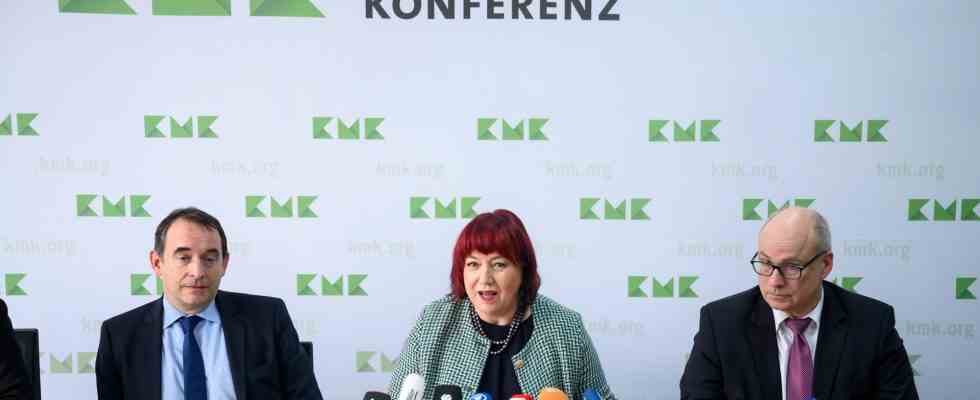Status: 03/17/2023 5:25 p.m
Self-praise for the unity: The state ministers of education rate the further harmonization of the Abitur as a success. They also agreed on measures to combat the shortage of teachers and decided to support schools in “difficult situations”.
In the future, the Abitur should be more comparable in the individual federal states. The Conference of Ministers of Education of the federal states (KMK) has agreed on this, as announced in Berlin.
“By agreeing on more uniform regulations on essential parameters of the upper secondary school, the Conference of Ministers of Education is not only implementing the political project formulated in October 2020, but also taking into account the demand of the Federal Constitutional Court for greater comparability of the Abitur,” explained KMK President Astrid-Sabine Buses (SPD). This lays the foundation for further adjusting the calculation basis for the average Abitur grade.
In Germany, education is a state sovereignty. As a result, different requirements for the calculation of the Abitur performance and the final grade used to apply depending on the country. For pupils who moved to another federal state during the upper school phase, this had an impact on the recognition of achievements.
Fewer performance courses
In the future, students in the upper secondary school should only choose two or three advanced courses; up to now there have been up to four, depending on the country. In total, high school graduates choose 40 compulsory courses during the upper level, the so-called qualification phase, of which 36 are included in the overall qualification, it said. So far, the number of compulsory courses has been between 32 and 40.
The changes will be mandatory for the students by 2027 at the latest, who will then enter the qualification phase and take their Abitur in 2030, it said.
The state ministers of education rated the further harmonization of the Abitur as a success. There has never been so much uniformity in this area, said the coordinator of the SPD states in the KMK, Hamburg’s school senator Ties Rabe.
Measures against the shortage of teachers
In addition, the Conference of Ministers of Education (KMK) wants to take concerted action against the shortage of teachers. In a joint statement, the heads of department wrote that they want to attract teachers by making it easier for them to switch courses from a technical or artistic course to a teaching degree.
In addition, career changers and lateral entrants should be more easily won over to enter the teaching profession. They are to be qualified and the qualifications are to be made comparable in such a way that a change to another federal state is also possible.
It is also being examined whether students who have completed a bachelor’s degree in a required subject can be admitted to the Master of Education course and make up for the missing content for the teaching profession in full. The possibility of opening up dual courses of study is also being examined. The federal states are also examining ways of recognizing qualifications obtained abroad more easily and qualifying applicants from abroad more quickly for teaching.
Funding for schools in “difficult situation”
Schools that have a particularly large number of students with special needs or that are “in a particularly difficult environment” should be given more support in order to maintain more equal opportunities. It affects a total of 4,000 schools, around ten percent of all schools in Germany. Bremen, North Rhine-Westphalia and Berlin were given as examples. Up to 4,000 jobs and better equipment for schools and classrooms are to be made possible.
The program will run for ten years. According to the current status, the federal government wants to give one billion euros per year and is counting on the states to do the same. The program is scheduled to start in the 2024/25 school year.
More protection against sexual violence
The KMK has also decided on guidelines for “Child Protection in Schools”. It deals with protection concepts and measures against sexual violence.
The offers of help for the schools include, among other things, collections of material on the individual elements of a protection concept such as mission statement, intervention plan, code of conduct and information on further training as well as checklists. “Schools must be shelters where children are heard, have dedicated contact persons and help is organized,” explained Busse. Prevention work is of central importance.

